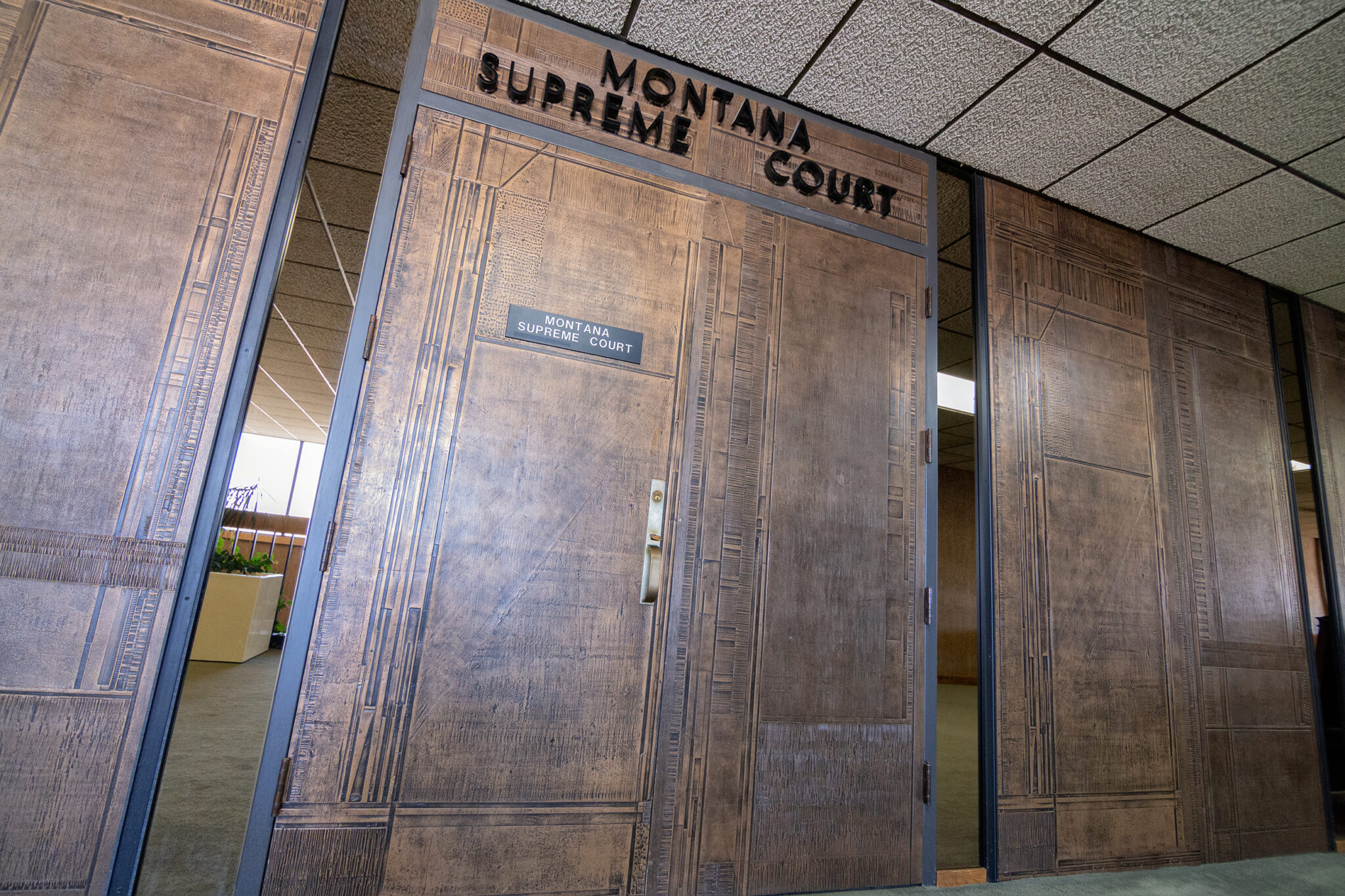Committee members vote on party lines against adopting minority report
By Keila Szpaller DAILY MONTANAN
“An outrageous attack.”
“Unseemly.”
“Unprecedented.”
“Unjustified.”
The two Democratic minority members of the Special Select Committee on Judicial Accountability and Transparency offered those descriptions of a Republican majority report adopted Thursday on practices of the judiciary.

In the 2021 legislative session, Republican lawmakers pushed for more oversight of the judiciary, and a report released last week outlines concerns from the majority and potential solutions for the 68th Montana Legislature.
The report reiterates concerns GOP legislators raised previously, such as the propriety of having judges offer opinions on bills that affect the judiciary; the judiciary previously argued it’s been standard practice to do so, and a minority report notes the Code of Judicial Conduct not only authorizes such activity, it encourages it.
Generally, the majority report noted lawmakers on the committee looked at judicial lobbying practices and public records retention and issued related recommendations: “It is essential to the integrity of the judicial branch that these problems and other issues examined in this report be fixed.”
The minority issued a report in response and said its members did not participate in drafting the majority’s document. Democrats alleged the majority’s report contained “bombastic accusations” and is “striking for its total lack of substance.”
Chief Justice Mike McGrath also sent a letter to the committee chairman in response. McGrath cited “dismay” at some of the language used, said the judicial branch already has implemented many of the report’s recommendations, and requested “libelous accusations” regarding his veracity be removed.
“The lack of professionalism displayed here is astonishing and certainly does not comport with any sense of accepted legislative protocol,” McGrath wrote. “ … We hope that, moving forward, we will be able to maintain a respectful and positive working relationship.”

Thursday, the select committee adopted the majority report 4-2 on a party line vote — with little discussion from Republicans and sharp rebuke from Democrats. Sen. Diane Sands, D-Missoula, said it could be grounds for a libel lawsuit.
In its first public draft, the report described Montana Supreme Court Chief Justice McGrath as having “repeatedly lied” to the legislature, and the court administrator’s attorney as having lied — allegations McGrath disputed in his letter. McGrath’s name is a chapter heading in the document.
At the meeting, Sen. Greg Hertz, R-Polson, said he removed the references to lies based on comments he received. However, Hertz, who led the committee, declined Sands’ request to remove a statement that said McGrath “misled and was untruthful” to the legislature.
“I think those comments are still appropriate in regard to the information that is in the report,” Hertz said.
Legislative records note Sands first served in the legislature in 1997, and she completes her service this year. Thursday, she said she believes deeply in democracy and the respectful way lawmakers have historically treated each other and other branches of government, but she said the report represents an “unseemly” breach of decorum, in particular by criticizing a person by name.
At the end of the meeting, Sands said she was disappointed to depart with the vote Thursday as her last in nearly 30 years: “We are in fact attacking and trying to undermine the Constitution in very many ways, and I regret that my last vote and my last participation in a committee is regarding that issue.”
Rep. Kim Abbott, the other minority member of the committee, agreed. Minority Leader Abbott, D-Helena, described the accusations and call for discipline of a private citizen in the report as “unprecedented,” and she said she wanted it to be clear the report was a product of the Republicans on the committee. She said even with the deletions, she was “deeply uncomfortable” to see the document advance.
“You know me,” Abbott said. “It takes quite a bit to get under my skin, but this final report did that. I think it is outrageous, and I’ll be voting against it.”
Also on a 4-2 vote on party lines, the committee opposed the official adoption of the minority report. In part, the minority argued: “Though the Majority Report adds nothing new, it is rife with errors, misstatements, hyperbole, and unsupported accusations.”
Sands said it was important to include the perspective from the minority, but Hertz said he did not find its content significant, and regardless, it would remain part of the public record.
Excerpts from Reports, Letter
The majority report adopted Thursday by the Special Select Committee on Judicial Accountability and Transparency contained a series of allegations and recommendations regarding the judiciary — ones the minority disputed in its own report.
Montana Supreme Court Chief Justice Mike McGrath himself responded to the majority and said the judicial branch already had adopted many of its recommendations.
The reports address a variety of issues related to the judiciary. Here are three examples with perspectives from the majority, minority and chief justice.
Montana Judges Association (MJA) Polling
Majority: “Judges expressing an opinion on legislation creates due process and basic fairness concerns should the legislation be challenged in court as such a practice creates the real or perceived concern that the judge has reached a predetermined conclusion before all parties have had an opportunity to present their arguments.”
Minority: “The Montana Code of Judicial Conduct anticipates that judges will appear before the Legislature and share their views on pending legislation affecting courts. Surely it is no surprise that judges and their representatives in MJA solicited their colleagues’ views before presenting them to the Legislature.”
However, “the MJA has ceased polling its members on bills affecting the judiciary, and judges and Justices already recuse themselves from cases involving bills upon which they have expressed a view.”
Chief Justice: “Rule 3.2 of the Code of Judicial Conduct recognizes that judges may consult with legislative bodies ‘in connection with matters concerning the law, the legal system, or the administration of justice.’ This has been the practice for decades, and I expect it will be common practice in the future.”
The chief justice said judicial conduct rules already mandate judges avoid potential conflicts of interest, and state law allows parties to file motions to disqualify a judge even without cause.
Public Records Retention
Majority: “Montanans have a broad constitutional ‘right to know’ under the State Constitution, which includes the right to examine public documents with very limited exceptions. The judicial branch of government for years routinely deleted public records.”
Also, “the judicial branch adopted a new records retention policy on April 5, 2022, to address the shortcomings in its former policy. The new policy requires the retention of the types of emails that had been previously deleted.”
Minority: “Perhaps the most meaningful work of this committee has been to highlight just how poor record retention practices are across state government — including, and especially, in the legislative and executive branches of government. But the Majority Report focuses on the judiciary only, and once again tries to manufacture a cloud of scandal.”
Also, “the Majority Report reluctantly acknowledges that the judiciary has, in fact, adopted a new records retention schedule that addresses the Committee’s concerns. By contrast, the executive still appears to follow a dated records retention policy whose first section is entitled, ‘What is Email?’”
Chief Justice: “Many of the recommendations suggested in the report are already implemented in the Code of Judicial Conduct, or have recently been adopted as branch policy.” For example, the judicial branch recently adopted a formal email policy.
Judicial Standards Commission (JSC)
Majority: The Commission’s “current operations are opaque with many of its activities and decisions not subject to public disclosure.” Three-fifths of its membership is decided by members of the judicial branch, and the Montana Supreme Court makes ultimate decisions. “The combination of these factors opens the door to improper influence over and biases within the JSC in favor of judges and against complainants.”
Minority: “The Majority Report’s basic grievance about the Judicial Standards Commission appears to be that the judicial branch oversees its own discipline. But the same is true for the legislature and, in practice, most ethical requirements for the executive.”
Also, “the Montana Constitution’s decision to empower the judicial branch to oversee its own discipline is not out of place at all; it is consistent with basic concepts of separation of powers and is the normal practice for virtually all state and federal courts in America.”
Chief Justice: The Commission is constitutionally created and enforces the Code of Judicial Conduct, and its proceedings are confidential. “As a branch, we welcome traditional and productive forms of legislative oversight. For example, the Law and Justice Interim Committee recently conducted a study of the Commission and issued a report,” and one from the Legislative Audit Division is underway.














